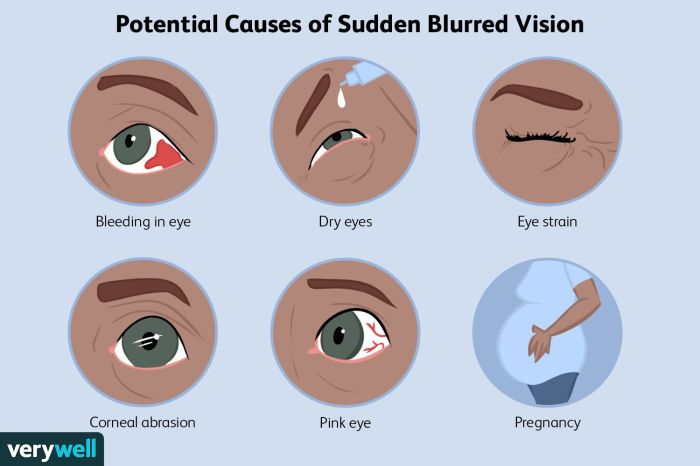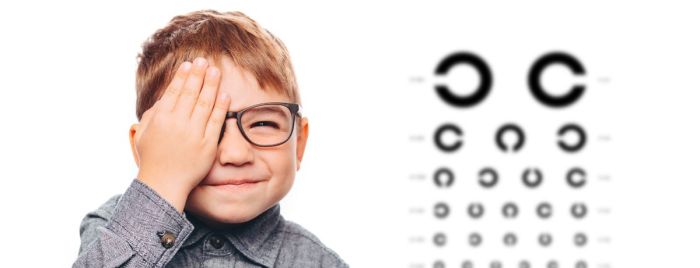With blurred vision rhymes with lazy at the forefront, this piece delves into the fascinating world of eyesight, exploring the causes, impacts, and remedies for this common yet often overlooked condition. From the intricate workings of our eyes to the lifestyle factors that can influence our vision, we embark on a journey to understand the nuances of blurred vision and its implications for our daily lives.
Blurred vision, a condition where objects appear hazy or unclear, can stem from various factors, including underlying eye conditions, lifestyle choices, and even medications. Its impact extends beyond mere inconvenience, affecting our ability to perform tasks effectively, navigate social situations confidently, and engage in activities that require clear vision.
Define blurred vision

Blurred vision, also known as ametropia, is a condition in which the images formed on the retina are not clear, resulting in impaired vision. It can affect one or both eyes and can range in severity from mild to severe.
Blurred vision occurs when the light entering the eye is not properly focused on the retina, the light-sensitive tissue at the back of the eye. This can be caused by a variety of factors, including refractive errors, eye diseases, and neurological problems.
Causes of blurred vision
The most common causes of blurred vision are refractive errors, which occur when the shape of the eye or the curvature of the cornea (the clear, front part of the eye) is not ideal for focusing light on the retina.
Refractive errors include:
- Nearsightedness (myopia): Difficulty seeing distant objects clearly
- Farsightedness (hyperopia): Difficulty seeing close objects clearly
- Astigmatism: Uneven curvature of the cornea, causing distorted vision at all distances
Other causes of blurred vision include:
- Eye diseases, such as cataracts, glaucoma, and macular degeneration
- Neurological problems, such as stroke, multiple sclerosis, and brain tumors
- Certain medications, such as antihistamines and antidepressants
- Dry eyes
- Aging
Symptoms of blurred vision
The most common symptom of blurred vision is difficulty seeing objects clearly at certain distances. Other symptoms can include:
- Double vision
- Halos around lights
- Eye strain
- Headaches
Explore the causes of blurred vision

Blurred vision is a common symptom that can have a variety of underlying causes. Understanding the potential causes can help individuals take proactive steps to address and prevent this issue.
Common eye conditions that can cause blurred vision
- Refractive errors:Myopia (nearsightedness), hyperopia (farsightedness), and astigmatism are common refractive errors that can result in blurred vision at specific distances.
- Cataracts:The clouding of the eye’s natural lens can lead to blurred or cloudy vision, especially in low-light conditions.
- Glaucoma:Increased pressure within the eye can damage the optic nerve, causing blurred vision, blind spots, and potential vision loss.
- Macular degeneration:Age-related damage to the macula, the central part of the retina, can result in blurred or distorted vision.
- Retinal detachment:The separation of the retina from the back of the eye can cause sudden blurred vision, floaters, and flashes of light.
Lifestyle factors that can contribute to blurred vision
Certain lifestyle factors can also contribute to blurred vision, including:
- Excessive screen time:Prolonged use of electronic devices can strain the eyes and lead to dry eyes, which can result in blurred vision.
- Poor lighting:Reading or working in dim lighting can cause eye strain and blurred vision.
- Dry eyes:Insufficient tear production can cause dry eyes, leading to blurred vision, irritation, and discomfort.
- Alcohol and tobacco use:Alcohol and tobacco consumption can dehydrate the body, including the eyes, potentially contributing to blurred vision.
Potential impact of medications on blurred vision
Some medications can have side effects that include blurred vision, such as:
- Antihistamines:These medications can dry out the eyes, leading to blurred vision.
- Antidepressants:Certain antidepressants can cause pupil dilation, resulting in blurred vision.
- Blood pressure medications:Some blood pressure medications can lower blood pressure too much, causing dizziness and blurred vision.
Examine the Impact of Blurred Vision on Daily Life

Blurred vision can have a significant impact on an individual’s daily life, affecting various aspects of their routine and well-being.
Impact on Work and School Performance
Blurred vision can impair an individual’s ability to perform tasks that require clear vision, such as reading, writing, and using computers. This can lead to decreased productivity and difficulty completing assignments on time, potentially affecting academic or professional performance.
Challenges in Social Situations
Blurred vision can make it difficult to recognize faces and expressions, which can lead to misunderstandings and social awkwardness. Additionally, individuals with blurred vision may feel self-conscious about their appearance, which can affect their confidence and social interactions.
Risks Associated with Driving or Operating Machinery
Blurred vision poses significant risks when driving or operating machinery. It can impair depth perception, making it difficult to judge distances and navigate safely. This can increase the likelihood of accidents and injuries.
Explore the Diagnostic Methods for Blurred Vision: Blurred Vision Rhymes With Lazy

Diagnosing blurred vision requires a comprehensive eye examination to determine the underlying cause. Eye exams involve a series of tests to assess visual acuity, eye alignment, and overall eye health.
Eye Exams for Blurred Vision
- Visual Acuity Tests:These tests measure the sharpness of vision using charts with letters or symbols. They determine the clarity of vision at different distances and help detect refractive errors like nearsightedness, farsightedness, and astigmatism.
- Retinoscopy:This test uses a lighted instrument to assess the eye’s refractive power. It helps determine the type and degree of refractive error, such as the need for eyeglasses or contact lenses.
- Ophthalmoscopy:This examination involves using a lighted instrument to examine the inside of the eye, including the retina, optic nerve, and blood vessels. It helps detect abnormalities that may cause blurred vision, such as macular degeneration or diabetic retinopathy.
- Slit Lamp Examination:This test uses a specialized microscope to examine the front of the eye, including the cornea, iris, and lens. It can detect conditions like cataracts, corneal ulcers, and uveitis.
- Tonometry:This test measures the pressure inside the eye (intraocular pressure). Elevated intraocular pressure can indicate conditions like glaucoma, which can lead to blurred vision and vision loss.
Importance of a Comprehensive Eye Exam
A comprehensive eye exam is crucial for accurate diagnosis of blurred vision because it allows the eye doctor to:
- Determine the underlying cause of blurred vision
- Rule out serious eye conditions that may require treatment
- Prescribe appropriate corrective lenses or treatments to improve vision
- Monitor eye health over time and detect any changes that may affect vision
Discuss treatment options for blurred vision

Blurred vision is a common problem that can be caused by a variety of underlying conditions. The treatment options for blurred vision will depend on the underlying cause.There are a number of different treatment options available for blurred vision, including:
- Eyeglasses or contact lenses
- Surgery
- Medication
- Lifestyle changes
The choice of treatment will depend on the severity of the blurred vision, the underlying cause, and the patient’s overall health.
If your vision is blurred, it may be a sign of being lazy, as the saying goes. But what exactly is the cause of this blurred vision? One possible explanation is a problem with the window of the eye, also known as the cornea.
To learn more about the cornea and its role in vision, click here . Understanding the window of the eye can help us appreciate the importance of clear vision and the consequences of neglecting our eye health.
Eyeglasses or Contact Lenses
Eyeglasses or contact lenses are the most common treatment for blurred vision. They can correct refractive errors, such as nearsightedness, farsightedness, and astigmatism.
Surgery, Blurred vision rhymes with lazy
Surgery may be necessary to treat blurred vision caused by cataracts, glaucoma, or other eye conditions.
Medication
Medication may be used to treat blurred vision caused by certain medical conditions, such as diabetes or macular degeneration.
Lifestyle Changes
Lifestyle changes, such as quitting smoking and eating a healthy diet, can help to improve vision and prevent blurred vision.It is important to see an eye doctor if you are experiencing blurred vision. The doctor can determine the cause of the blurred vision and recommend the best treatment option.
Describe the role of lifestyle modifications in managing blurred vision

Lifestyle modifications can play a significant role in managing blurred vision and improving visual clarity. By adopting healthy habits, individuals can reduce the risk of developing vision problems or slow their progression.
Regular exercise, a balanced diet, and adequate sleep are crucial for overall health and well-being, including eye health. Exercise helps improve blood circulation, which is essential for nourishing the eyes and removing waste products. A diet rich in fruits, vegetables, and whole grains provides antioxidants and nutrients that support eye health.
Getting enough sleep allows the eyes to rest and repair themselves.
Eye Care Practices
Specific eye care practices can also help manage blurred vision. Wearing sunglasses when outdoors protects the eyes from harmful UV rays, which can damage the delicate tissues of the eye. Using artificial tears or lubricating eye drops can help keep the eyes moist and reduce dryness, a common cause of blurred vision.
Regular Eye Exams
Regular eye exams are essential for monitoring blurred vision and detecting underlying eye conditions. Eye exams allow optometrists or ophthalmologists to assess visual acuity, examine the health of the eyes, and identify any abnormalities. Early detection and treatment of eye conditions can help prevent vision loss or slow its progression.
Query Resolution
What are the common causes of blurred vision?
Blurred vision can result from various factors, including refractive errors (nearsightedness, farsightedness, or astigmatism), eye conditions (cataracts, glaucoma, macular degeneration), lifestyle choices (excessive screen time, poor lighting), and medications (antihistamines, antidepressants).
How does blurred vision affect daily life?
Blurred vision can hinder work and school performance by making it difficult to read, write, or use computers. It can also pose challenges in social situations, affecting communication and confidence. Furthermore, blurred vision while driving or operating machinery can increase the risk of accidents.
What are the treatment options for blurred vision?
Treatment options for blurred vision vary depending on the underlying cause. Corrective lenses (glasses or contact lenses) can address refractive errors. Eye drops, medications, or surgery may be necessary for eye conditions. Lifestyle modifications, such as reducing screen time and improving lighting, can also help improve vision clarity.